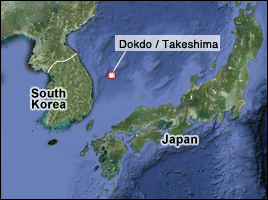SEOUL — South Korean President Lee Myung-bak has visited a set of disputed islets in the sea between Japan and Korea, causing a diplomatic rift between the two nations.
Lee Myung-bak is the first South Korean leader to visit the rocky outcrops, called Dokdo in Korean and Takeshima in Japanese. The islets have been at the center of a dispute between the two nations since the end of Japan’s colonization of the Korean peninsula in 1945.

A senior researcher at the Korean government-funded Northeast Asian History Foundation, Lee Myong-chan, says the president’s trip was intended to counter Japanese claims.
He says, President Lee’s visit expresses Korea's strong determination on Dokdo and also sends a strong message to Japan that Korea will not accept any provocation anymore. He says he thinks Lee did what he had to do as a head of the nation.
Both countries say they maintain legal jurisdiction over the rocks, which are surrounded by rich fishing waters and untapped natural resources.
President Lee’s trip to the disputed territory was met with criticism in Tokyo.
Foreign Minister Koichiro Gemba questioned why President Lee had to make the trip now and called it utterly unacceptable. He says Tokyo has temporarily recalled its ambassador in South Korea in protest.
In Seoul, Lee’s ruling party applauded his visit to the rocks, calling it a meaningful move to defend South Korea’s territory.
However the main opposition party responded by declaring that the trip was just a publicity stunt and was aimed at deflecting criticism of Lee’s administration.
President Lee’s approval rating is low as he nears the end of his single term in office next March. And some observers say his visit to the islet Friday is a win-win tactic that might boost his popularity.
“It's a perfect strategic move," said Jasper Kim heads the Asia-Pacific Global Research Group in Seoul. "For legacy, because he is in effect a lame duck president, he wants to be remembered at least as a patriotic president”
Kim adds that President Lee might also hope that this trip will help South Koreans forget about a bribery scandal involving his brother.
Lee Myung-bak is the first South Korean leader to visit the rocky outcrops, called Dokdo in Korean and Takeshima in Japanese. The islets have been at the center of a dispute between the two nations since the end of Japan’s colonization of the Korean peninsula in 1945.

A senior researcher at the Korean government-funded Northeast Asian History Foundation, Lee Myong-chan, says the president’s trip was intended to counter Japanese claims.
He says, President Lee’s visit expresses Korea's strong determination on Dokdo and also sends a strong message to Japan that Korea will not accept any provocation anymore. He says he thinks Lee did what he had to do as a head of the nation.
The Dokdo-Takeshima Islands
The Dokdo-Takeshima Islands- Known as Dokdo in Korean and as Takeshima in Japan
- Claimed by Japan and South Korea
- Occupied by South Korea since 1954
- Located between the two countries in fish-rich waters
- Uninhabited except for a South Korean Coast Guard outpost and an elderly couple
- Less than 200,000 square meters in size
President Lee’s trip to the disputed territory was met with criticism in Tokyo.
Foreign Minister Koichiro Gemba questioned why President Lee had to make the trip now and called it utterly unacceptable. He says Tokyo has temporarily recalled its ambassador in South Korea in protest.
In Seoul, Lee’s ruling party applauded his visit to the rocks, calling it a meaningful move to defend South Korea’s territory.
However the main opposition party responded by declaring that the trip was just a publicity stunt and was aimed at deflecting criticism of Lee’s administration.
President Lee’s approval rating is low as he nears the end of his single term in office next March. And some observers say his visit to the islet Friday is a win-win tactic that might boost his popularity.
“It's a perfect strategic move," said Jasper Kim heads the Asia-Pacific Global Research Group in Seoul. "For legacy, because he is in effect a lame duck president, he wants to be remembered at least as a patriotic president”
Kim adds that President Lee might also hope that this trip will help South Koreans forget about a bribery scandal involving his brother.




